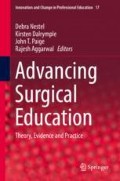Overview
This chapter explores the importance of the surgical workplace as a centre of learning. A sociocultural learning theory known as activity theory will be described and related to the field of surgery to help illuminate this multifaceted and complicated environment. Comparisons will be made with the theory of situated learning and communities of practice. Newer developments on activity theory such as knot-working and actor-network theory will be discussed. As a defining feature of activity theory, the prominent position of culturally mediated artefacts will be argued as both promoter and hinderer of expansive learning. Two published case studies of the surgical workplace will be critically considered to illustrate the strengths and weaknesses of an activity theory-based approach. Case study one examines the reality of collaborative multidisciplinary learning in practice, specifically the relationship across different specialities involved in the treatment of patients with suspected breast cancer. Case study two concerns what we can learn from how expert surgeons go about preparing to lead a theatre team towards excellent performance and how this knowledge is passed on to trainees.
Access this chapter
Tax calculation will be finalised at checkout
Purchases are for personal use only
References
Swanwick, T. (2005). Informal learning in postgraduate medical education: From cognitivism to ‘culturism’. Medical Education, 39(8), 859–865.
Wright, S. M., Kern, D. E., Kolodner, K., Howard, D. M., & Brancati, F. L. (1998). Attributes of excellent attending-physician role models. New England Journal of Medicine, 339(27), 1986–1993.
Lave, J., & Wenger, E. (1991). Situated learning: Legitimate peripheral participation. Cambridge, UK: Cambridge university press.
Sfard, A. (1998). On two metaphors for learning and the dangers of choosing just one. Educational Researcher, 27(2), 4–13.
Engeström, Y. (2010). Activity theory and learning at work. In M. Malloch, L. Cairns, K. Evans, & B. N. O’Connor (Eds.), The SAGE handbook of workplace learning (p. 86). Los Angeles: Sage.
Bleakley, A. (2006). Broadening conceptions of learning in medical education: The message from teamworking. Medical Education, 40(2), 150–157.
Vygotsky, L. S. (1980). Mind in society: The development of higher psychological processes. Cambridge, MA: Harvard University Press.
Leont’ev, A. N. (1974). The problem of activity in psychology. Soviet Psychology, 13(2), 4–33.
Engestrom, Y. (1987). Learning by expanding. Helsinki: Orienta-Konsultit Oy.
Engeström, Y., & Blackler, F. (2005). On the life of the object. Organization, 12(3), 307–330.
Engeström, Y. (1999). Expansive visibilization of work: An activity-theoretical perspective. Computer Supported Cooperative Work (CSCW), 8(1–2), 63–93.
Cole, M., & Engeström, Y. (1993). A cultural-historical approach to distributed cognition. Distributed cognitions: Psychological and educational considerations (pp. 1–46).
Kuutti, K. (1991). Activity theory and its applications to information systems research and development. Information systems research: Contemporary approaches and emergent traditions (pp. 529–549).
Latour, B. (2005). Foreword by Bruno Latour. In B. Latour (Ed.), Reassembling the social-an introduction to actor-network-theory (p. 316). Oxford: Oxford University Press Sep 2005 ISBN-10: 0199256047 ISBN-13: 9780199256044. 2005; 1.
Wenger, E. (1998). Communities of practice: Learning, meaning, and identity. New York: Cambridge university press.
Lave, J. (1988). Cognition in practice: Mind, mathematics and culture in everyday life. New York: Cambridge University Press.
Fenwick, T., & Edwards, R. (2013). Performative ontologies. Sociomaterial approaches to researching adult education and lifelong learning. European Journal for Research on the Education and Learning of Adults, 4(1), 49–63.
Sørensen, E. (2009). The materiality of learning: Technology and knowledge in educational practice. New York: Cambridge University Press.
Waltz, S. B. (2006). Nonhumans unbound: Actor-network theory and the reconsideration of “Things” in educational foundations. Educational Foundations, 20(3), 51–68.
Fenwick, T., & Edwards, R. (2010). Actor-network theory in education. London: Routledge.
Bleakley, A. (2012). The proof is in the pudding: Putting actor-network-theory to work in medical education. Medical Teacher, 34(6), 462–467.
Heldal, F. (2010). Multidisciplinary collaboration as a loosely coupled system: Integrating and blocking professional boundaries with objects. Journal of Interprofessional Care, 24(1), 19–30.
Star, S. L., & Griesemer, J. R. (1989). Institutional ecology, translations’ and boundary objects: Amateurs and professionals in Berkeley’s Museum of Vertebrate Zoology, 1907–39. Social Studies of Science, 19(3), 387–420.
Engeström, Y., Engeström, R., & Vähäaho, T. (1999). When the center does not hold: The importance of knotworking. In S. Chaiklin, M. Hedegaard, & U. Jensen (Eds.), Activity theory and social practice (pp. 345–374). Aarhus: Aarhus University Press.
Varpio, L., Hall, P., Lingard, L., & Schryer, C. F. (2008). Interprofessional communication and medical error: A reframing of research questions and approaches. Academic Medicine, 83(10), S76–S81.
Ibrahim, E. F., Richardson, M. D., & Nestel, D. (2015). Mental imagery and learning: A qualitative study in orthopaedic trauma surgery. Medical Education, 49(9), 888–900.
Davydov, V. V. (1988). Problems of developmental teaching: The experience of theoretical and experimental psychological research. Soviet Education, 30(8), 6–97.
Author information
Authors and Affiliations
Corresponding author
Editor information
Editors and Affiliations
Rights and permissions
Copyright information
© 2019 Springer Nature Singapore Pte Ltd.
About this chapter
Cite this chapter
Ibrahim, E.F. (2019). Activity Theory and the Surgical Workplace. In: Nestel, D., Dalrymple, K., Paige, J., Aggarwal, R. (eds) Advancing Surgical Education. Innovation and Change in Professional Education, vol 17. Springer, Singapore. https://doi.org/10.1007/978-981-13-3128-2_10
Download citation
DOI: https://doi.org/10.1007/978-981-13-3128-2_10
Published:
Publisher Name: Springer, Singapore
Print ISBN: 978-981-13-3127-5
Online ISBN: 978-981-13-3128-2
eBook Packages: EducationEducation (R0)

